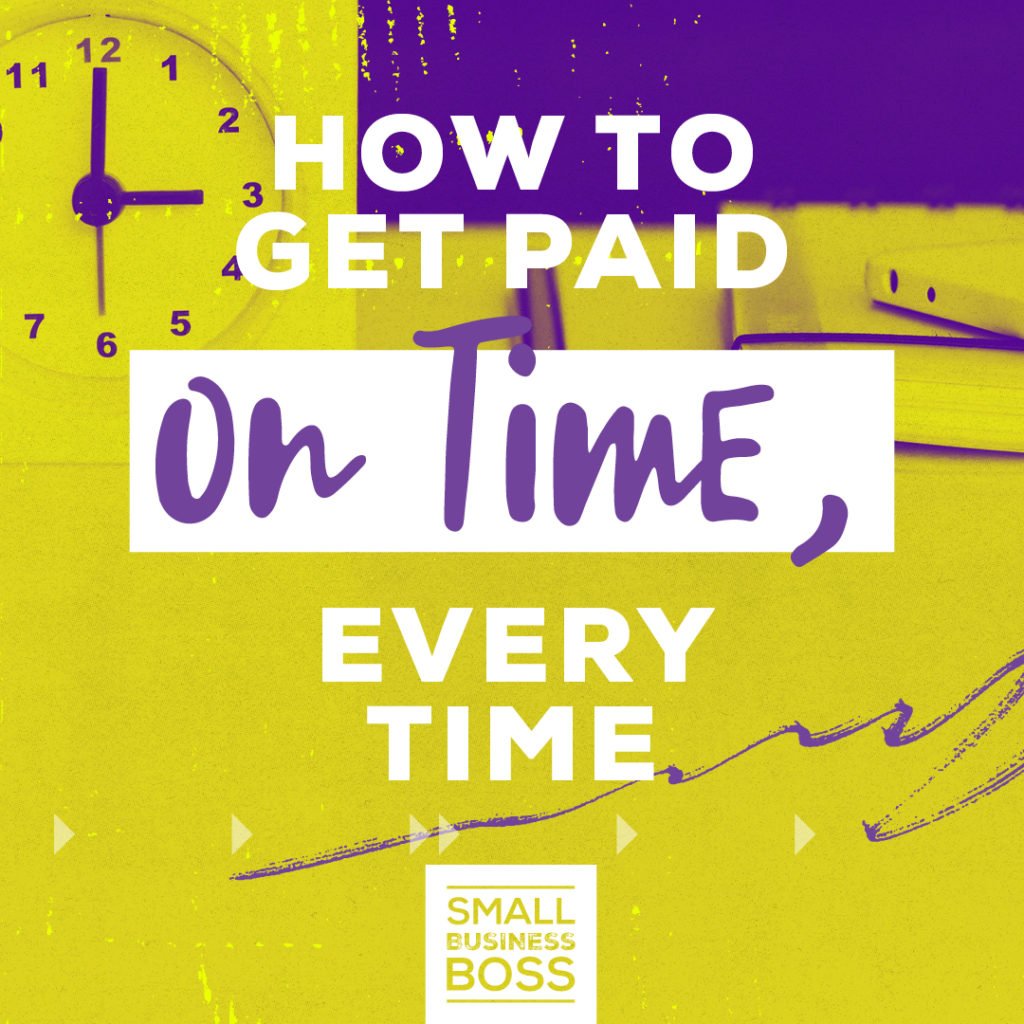
Episode 116: How to Get Paid On Time, Every Time
You sent the invoice. And…it’s crickets. It’s been days, and there’s no payment in sight. In fact, you think the client may be avoiding you. In this episode, we’re going to talk about how to get paid on time, every time and what to do when the payment is late.
If you’ve been a boss for a hot minute, you’ve experienced the irritation of clients who are slow to pay, ghost you, or simply avoid you. It’s not cool, but there are a number of things you can do to stack the odds in your favor.
Before we dive in, a quick story. When I was an account executive working in a PR agency, I was responsible for billing my clients. While accounting would prepare reports and documents, I was the frontline of communication with the client if there were questions, issues, or even late payments. Honesty, it was terrifying, but let me tell you, I’m insanely grateful for that experience as when I started my own business, I had the skills to ensure I got paid.
Now, I realize not everyone has that experience and asking for money can be a challenge or feel icky. So the first thing you need to do is realize that invoicing and payments are functional realities. If you can strip out as much of the emotion around it as possible, it makes it easier to set yourself up for success.
Get Paid Upfront
- If you can, set your contracts up so people pay for your services in advance.
- With packages, you can offer payment plans to break up the cost, or with monthly retainers, have them pre-pay for the coming month.
- The more you can get pre-payment, the more you can offset the risk of not getting paid or having delays in payment as the client understands that they need to pay for you to do the work.
- This won’t work in every situation, but it’s worth starting off with this when you engage with a potential new client.
- If this is new to you, don’t foist this on your existing clients, but instead roll it out as you bring in new clients.
Set Up Clear Payment Terms
- You want to get paid? Make it CLEAR how payments work with you. Your proposals and contracts should spell out everything possible about payments — deadlines, late fees, how they can pay you and so on.
- If you run into issues in specific areas, change your payment terms. Every time I have a situation with a client come up, I get my contracts revised, so it can’t happen again.
- Start your proposal with your ideal scenario — don’t wimp out and just go for what’s safe. If a client wants different terms, you can negotiate. Go in with what’s the best case scenario for you.
Make It Easy to Pay You
- Want to get paid on time every single time? Make it EASY to pay you.
- Nothing creates more friction with a client paying you than a process that requires more than a couple clicks.
- In the age of PayPal and online payments, asking your client to do more than that to save you money isn’t in service of them.
- If you want to save money, use Harvest or Freshbooks so you can receive PayPal payments for only a .50 cent fee.
- Apply to PayPal for lower merchant fees.
- Credit card processing fees are a cost of doing business. Period. And they’re a write off on your taxes.
- Invoice on time, every time. If you lack consistency, your clients won’t be consistent. Pick universal dates that don’t move that you invoice on. I do a lot of invoicing on the 25th and 10th of the month for ongoing clients.
Understand Client Schedules and Constraints
- If you’re constantly bumping up against payment issues, have a conversation with them, and ask them if they need a different payment schedule.
- For bigger organizations, ask when they do accounts payable and get a contact in accounting you can follow-up with. (Or copy your invoices to so they don’t get lost in your day-to-day contact’s calendar.)
- Work to find a solution that gets you paid and works on their end as well.
Don’t Come in Forceful Right Away
- That moment when you’re all bent out of shape that your invoice isn’t paid, take a breath and don’t go in strong. Go in kindly, and see what’s up. A reminder can go a long way to getting you paid.
- If you’re not getting a response, this is where another mode of communication can be particularly helpful.
- Should payment continue to be delayed, a direct email that says, “Hey, I need to get this invoice cleared up,” or if they’re local, “I’m going to stop by tomorrow to pick up the check for invoice #XX” — that sends a clear sign that they shouldn’t drag their heels anymore.
- Do NOT make threats. In many jurisdictions, you can’t claim that you’ll send someone to collections or legal action if you’re not willing to follow-through. Keep it classy, and use those things only when you’re at the point that you’re going to resort to them.
- Finally, don’t keep working when you’re not getting paid. When I did a lot of consulting work that was net 30, at net 40, the client would get the heads up that I required payment to continue, and checks would magically appear.
Offer to Help
- There are things that happen in business that are unexpected — from companies being bought to a cash flow issue. I’ve seen many, many things, and if you value your client relationship and want to keep working with the client, be helpful.
- Work out a payment arrangement on outstanding invoices.
- Restructure your agreement with different payment terms — more frequent invoices or different dates can help. (A good one if your day-to-day person can’t approve above a certain level is to invoice more frequently.)
Get Help
- Every so often you’re going to have a straight-up client that ghosts you. And if you have that issue, you can get help.
- A great option is a service from Just Tell Julie that many of my friends have used to get invoices closed out. There are fees involved, but well worth it if you get paid!
Links for this episode:


